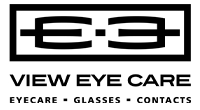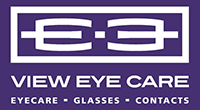You’re not alone if you’ve noticed that your headaches flare up when your eyes feel dry or irritated. While no evidence shows dry eyes cause headaches, they have similar triggers and frequently occur together. Understanding the link between dry eyes and headaches can help you find relief when you start to feel a headache coming on.
Consulting an optometrist about your dry eyes can help you manage that condition. When you visit us for an eye exam, we can help you determine what’s causing your dry eyes so you can avoid those triggers in the future.
What’s the Connection Between Dry Eyes & Headaches?
Understanding whether dry eyes can cause headaches requires unravelling the origins of both conditions. While the exact relationship isn’t fully understood, we know that the two are more connected than many people realize.
What Causes Dry Eyes?
Dry eyes occur when your eyes don’t produce enough tears or when the tears evaporate too quickly. This can lead to a gritty, burning sensation and light sensitivity. Some of the most common causes of dry eyes include:
- Screen Time: Long hours staring at a computer or phone can reduce your blink rate, causing tears to evaporate.
- Environmental Factors: Windy or dry climates can worsen dry eye symptoms.
- Contact Lenses: Wearing contact lenses for extended periods can lead to dryness.
- Medical Conditions: Diseases like Sjögren’s syndrome and rheumatoid arthritis can interfere with tear production.
- Aging: Tear production can naturally decrease with age, especially for postmenopausal women.
What Causes Headaches?
Headaches occur for various reasons, from dehydration to stress to long-term medical conditions. Common headache triggers include:
- Eye Strain: Prolonged screens or poor lighting can cause eye strain and tension headaches.
- Poor Posture: Sitting incorrectly puts pressure on your neck and shoulders, a common contributor to headaches.
- Stress: High stress levels can trigger tension headaches or migraines.
- Dehydration: Not drinking enough water can lead to the painful throbbing of a dehydration headache.
How Do I Know if My Eyes Are Causing My Headaches?
When you experience dry eyes, your body signals distress. This irritation can travel along the nerves connected to your eyes and head, potentially leading to a headache. Additionally, when your eyes don’t feel comfortable, you may unintentionally strain them by squinting or focusing harder, which can trigger or worsen headaches.
If your headaches coincide with screen time or environmental conditions that also trigger dry eyes, the two may be linked.
What Are the Symptoms of Dry Eyes & Headaches?
Knowing the specific symptoms can help you pinpoint whether dry eyes might be the root cause of your headaches.
What Does a Dry Eye Headache Feel Like?
A headache linked to dry eyes often feels like a dull, consistent ache around the eyes, temples, or forehead. Unlike migraines, which may be accompanied by nausea or sensitivity to noise, dry eye headaches tend to come with:
- Eye strain
- A sensation of dryness or grit in your eyes
- Difficulty concentrating due to eye discomfort
- Worsening pain as the day progresses, especially after prolonged screen use
What Are the Worst Symptoms of Dry Eye?
Dry eye symptoms can range from mild discomfort to severe irritation, but they often have lasting effects on your daily life. Symptoms to watch out for include:
- Intense burning or stinging in the eyes
- Blurry vision that doesn’t improve with blinking
- Watery eyes, which often develop as a reflex response to dryness
- Sensitivity to light, which may intensify headaches
- Red, inflamed eyes that don’t improve with basic treatments
If you’re frequently experiencing these symptoms alongside regular headaches, that’s a good indication they might be related.
How Are Dry Eyes & Headaches Diagnosed?
If you suspect dry eyes are causing your headaches, it’s best to seek a professional diagnosis. Here’s what the process typically looks like:
- Talking to Your Optometrist: We’ll ask about your symptoms, including whether your headaches flare up after activities like driving, reading, or using screens.
- Tear Film Test: This test measures the quantity and quality of your tears to see if dryness is an issue.
- Headache Evaluation: If needed, your doctor might perform additional tests to rule out other causes of your headaches, such as migraines, sinus issues, or tension-related conditions.
Diagnosing dry eyes effectively is crucial in ensuring you identify the correct triggers for your headaches and get the correct treatment.
Preventing & Treating Dry Eyes & Headaches
The good news? Whether you’re struggling with dry eyes, headaches, or both, there are plenty of solutions to prevent and treat these conditions.
Preventing Dry Eyes

Here’s how you can keep your eyes hydrated and comfortable:
- Reduce screen time or take frequent breaks using the 20-20-20 rule (look 20 feet away every 20 minutes for 20 seconds).
- Use a humidifier if you live in a dry environment to maintain moisture levels in the air.
- Blink more frequently, especially during focus-heavy activities.
- Wear protective eyewear in windy or sunny conditions.
- Use artificial tears or lubricating eye drops to keep your eyes moist.
Preventing Headaches
To minimize headache triggers, consider these strategies:
- Practice good posture while sitting at your desk or using your phone.
- Stay hydrated to avoid dehydration headaches.
- Manage stress using techniques such as mindful meditation or yoga.
- Adjust your screen settings, such as brightness and font size, to reduce eye strain.
Effective Treatments
If prevention isn’t enough, there are treatments to help relieve symptoms:
For dry eyes:
- Use prescription eye drops recommended by an eye doctor.
- Consider punctal plugs, a procedure where tiny devices block tear drainage to retain eye moisture.
- Use warm compresses to relieve irritation.
For headaches:
- Apply a cold compress to your forehead or temples.
- Take over-the-counter medicine, such as acetaminophen or ibuprofen, for moderate pain.
- Consult a doctor for specific migraine treatments if your headaches are severe.
Reclaim Eye Comfort & Relief from Headaches
At View Eye Care, we help our patients identify their symptoms and potential triggers so they can make lifestyle changes that help reduce eye discomfort and improve their quality of life.
Contact us today to consult an eye care professional. Our goal is to treat your dry eyes for long-term relief.




